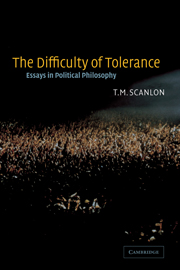Book contents
- Frontmatter
- Contents
- Acknowledgments
- Introduction
- 1 A theory of freedom of expression
- 2 Rights, goals, and fairness
- 3 Due process
- 4 Preference and urgency
- 5 Freedom of expression and categories of expression
- 6 Human rights as a neutral concern
- 7 Contractualism and utilitarianism
- 8 Content regulation reconsidered
- 9 Value, desire, and quality of life
- 10 The difficulty of tolerance
- 11 The diversity of objections to inequality
- 12 Punishment and the rule of law
- 13 Promises and contracts
- Index
10 - The difficulty of tolerance
Published online by Cambridge University Press: 15 December 2009
- Frontmatter
- Contents
- Acknowledgments
- Introduction
- 1 A theory of freedom of expression
- 2 Rights, goals, and fairness
- 3 Due process
- 4 Preference and urgency
- 5 Freedom of expression and categories of expression
- 6 Human rights as a neutral concern
- 7 Contractualism and utilitarianism
- 8 Content regulation reconsidered
- 9 Value, desire, and quality of life
- 10 The difficulty of tolerance
- 11 The diversity of objections to inequality
- 12 Punishment and the rule of law
- 13 Promises and contracts
- Index
Summary
WHAT IS TOLERANCE?
Tolerance requires us to accept people and permit their practices even when we strongly disapprove of them. Tolerance thus involves an attitude that is intermediate between wholehearted acceptance and unrestrained opposition. This intermediate status makes tolerance a puzzling attitude. There are certain things, such as murder, that ought not be tolerated. There are limits to what we are able to do to prevent these things from happening, but we need not restrain ourselves out of tolerance for these actions as expressions of the perpetrators' values. In other cases, where our feelings of opposition or disapproval should properly be reined in, it would be better if we were to get rid of these feelings altogether. If we are moved by racial or ethnic prejudice, for example, the preferred remedy is not merely to tolerate those whom we abhor but to stop abhorring people just because they look different or come from a different background.
Perhaps everything would, ideally, fall into one or the other of these two classes. Except where wholehearted disapproval and opposition are appropriate, as in the case of murder, it would be best if the feelings that generate conflict and disagreement could be eliminated altogether. Tolerance, as an attitude that requires us to hold in check certain feelings of opposition and disapproval, would then be just a second best – a way of dealing with attitudes that we would be better off without but that are, unfortunately, ineliminable.
Information
- Type
- Chapter
- Information
- The Difficulty of ToleranceEssays in Political Philosophy, pp. 187 - 201Publisher: Cambridge University PressPrint publication year: 2003
Accessibility standard: Unknown
- 11
- Cited by
